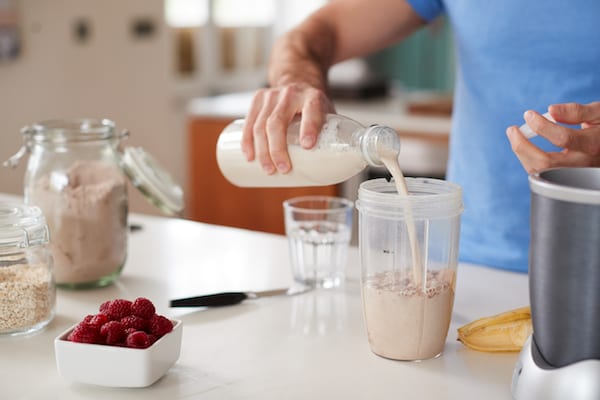Can Protein Shakes Make You Gain Weight?

Protein shakes and bodybuilders often go hand in hand, so many people may think that protein shakes are associated with bulking up and “getting those gains.” This may also lead people to wonder, Do protein shakes make you fat?
Truth be told: You can overdo it on any type of food, even if they’re protein sources.
If you eat more than what your body needs, you are likely to gain weight. But, no, protein shakes as part of a healthy, balanced diet will not make you fat on their own.
In fact, boosting your protein intake can be a handy way to help control your weight and reach your goals, including increasing muscle mass.
Here are some tips on how to use protein shakes to help you reach your goals in a way that’s convenient, and often delicious.
Why Protein Shakes May Make You Gain Weight

Are you drinking protein shakes often and starting to see your weight creep upward?
As with most foods, “it’s certainly possible to go overboard,” says Melissa Morris, Ed.D., a nutrition professor at the University of Tampa. “When that happens, you may see some weight gain as a result.”
If that’s your goal, great. But if you don’t want to gain weight, there are two major things to keep in mind: what’s in your shake and your overall calorie intake.
1. There’s too much extra stuff in your shake
Is your protein shake full of added sugar? While some added carbohydrates in a protein shake can be useful for restoring glycogen stores after a workout, too much of it can lead to negative side effects, especially if you’re not using it post-workout.
Also, are you adding other ingredients to your shake? If you use high-calorie foods, like peanut butter, dried fruit, or avocado, you might be consuming more calories than you realize.
(These can be great ingredients to add to a shake — just be aware of how much you’re adding if you’re focused on weight loss!)
2. It’s part of an unbalanced diet
Instead of asking if your protein shake is making you gain weight, you should be asking if your overall diet is making you gain weight.
You could drink the healthiest, cleanest whey protein shake on the planet, but it’s still just a dietary supplement — if it’s part of an overly-caloric diet, you’ll likely still gain weight.
But if you drink a protein shake as a part of a well-balanced diet, then you’ll be better equipped to stay on track with a weight management plan.
Is It OK to Drink Protein Shakes Without Working Out?

Although protein can help your muscles recover after a workout, protein shakes are not just for those who exercise regularly and are looking for muscle growth, says Morris.
Protein is a macronutrient, which means your body needs it to function. Your body breaks it down into its building blocks, amino acids, to help with functions like providing energy and stimulating muscle growth and repair. So yes, you need protein regardless of your physical activity level.
That doesn’t necessarily mean you need a protein shake, though. There are plenty of animal proteins, like beef and poultry, and plant-based proteins, like tofu and buckwheat.
But even with ubiquitous protein options, it’s not always easy to meet your daily quota through meals and snacks alone.
That’s where a protein shake comes in handy, suggests Morris, because it’s a convenient way to supplement the protein you’re getting through whole foods.
You can quickly whip up a shake (you don’t even need a blender!) and take it on the go, making it super accessible for even the busiest people.
By choosing a balanced, sugar-free protein powder (ideally also high in essential amino acids), you’ll get nutritious ingredients that will help fuel your body. Perfect in any situation.
How many calories should you get from protein?
Rather than trying to determine calories, it’s better to look at how many grams you should be consuming. Adults need about 0.8 grams of protein per kilogram of body weight. (To determine your weight in kilograms, divide your weight in pounds by 2.2.)
If you’re an avid exerciser, you likely know the importance of a high-protein diet. You should aim for 2 grams of protein per kilogram of body weight, according to the International Society of Sports Nutrition.
Is There Any Time You Shouldn’t Have a Protein Shake?

A protein shake at any point throughout the day is fine. Some people swear by a protein shake for an evening snack, while others love it as part of their breakfast.
So technically, the answer to this question is “no.”
That being said, it’s important to pay attention to how you feel after having a protein shake. For example, some people don’t do well with protein right before working out (and it’s really not the best time for it, anyway).
Some people find that a protein shake first thing in the morning helps keep them satiated, while others might prefer to have one for a snack later in the day.
Do what feels right to you, and that’s your best bet.
